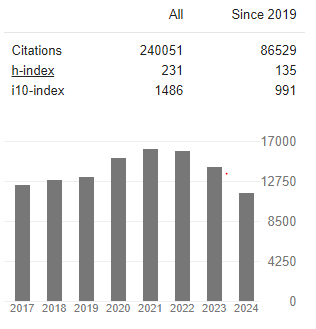E Cadherin Expression as risk factor Lymph Nodes Metastatic of Paediatric Thyroid Carcinoma
Abstract
Yohana Azhar, Dimyati Achmad, Kiki Lukman, Dany Hilmanto
Background: Although Paediatric Thyroid Carcinoma (PTC) has excellent prognosis, certain cases exhibit aggressive clinical manifestations. Treatment of PTC patient is therefore littered with controversies.
Purpose: We assessed the expression of RET/PTC1, TGFβRII and E-cadherin in PTC and metastatic lymph nodes, in order to investigate the mechanism underlying the mainly indolent but potentially aggressive of PTC.
Methods: A retrospective study included 93 PTC patients treated in our hospital were included in this study. All primary tumours and metastatic lymph nodes were immunohistochemically stained to evaluate the expression of RET/PTC1, TGF βRII and E-cadherin. Clinical characteristics also evaluated to predict the metastasis.
Results: A total of 77 (82.3%) were positive for RET/PTC1, 61(65.6%) positive for TGF βRII and 63 (67.7%) positive for E-cadherin. Even though Capsular Invasion, Size of tumours, TGF βRII and RET/PTC1 expression were significantly correlated with metastasis with multivariate analysis E-cadherin is the protein which was strongly correlated with metastasis (P<0.001 OR = 263.53; 95% CI (21.88-3172.72).
Conclusion: Our results suggest that the decreased expression of E-cadherin in primary lesion is correlated with regional lymph node for metastasis in PTC. E-cadherin may be useful as a marker for metastatic potential in PTC. The expression of transforming growth factor βRII in PTC was shown to be associated with clinically aggressive characteristics. RET/PTC1 rearrangement still remains the cause of spontaneous PTC in Indonesia



